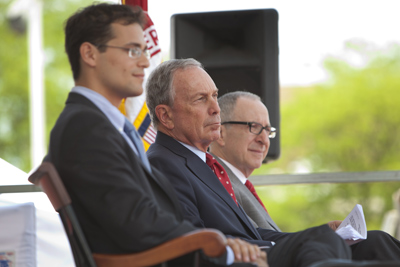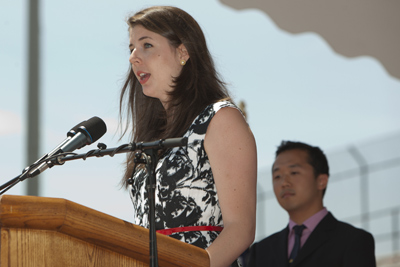Bloomberg delivers humor, history in Convocation address
By George Lowery





A disarming Michael Bloomberg had soon-to-be Cornell graduates and their families roaring with laughter at the Class of 2012 Senior Convocation May 26 in Schoellkopf Field. The New York City mayor, whom President David Skorton noted in his introduction has excelled in business, government and philanthropy, delivered lines worthy of a stand-up comic before turning to a timely message on how government and education can shape history.
While Skorton is known for moving into a freshman residence hall during Orientation week, Bloomberg joked that he would institute something similar for people who move to New York City, telling Cornell grads relocating there, "I'll be over." "Don't worry," he added, "I'll be fine on the couch." In his research preparing for Convocation, Bloomberg said that he had read "161 Things to Do Before You Graduate" in the Cornell Daily Sun. "If you've done a lot of them, congratulations. Great job," he said to the senior class. "If you've done all of them, please turn yourself in to the Cornell police."
On a more serious note, Bloomberg pointed out that 2012 marks the 150th anniversary of the Morrill Land Grant Act of 1862 which established land-grant colleges such as Cornell -- one of the first -- to promote practical agriculture and engineering. President Abraham Lincoln "signed the act because he understood that government had a role to play in preparing generations of young Americans to participate in, and lead, the industrial economy," Bloomberg said. "The innovations, inventions and ideas produced by America's higher education system became our nation's unparalleled competitive advantage -- and catapulted us to the forefront of the industrial age."
The day before Lincoln signed the Morrill Act in July 1862, Bloomberg noted, he had signed the Pacific Railroad Act that granted land and financing to build railroad lines from the Missouri River to the Pacific Ocean. Those railroads would "provide the crucial supply lines that fed the industrial innovations our universities were helping to pioneer," Bloomberg said. "In fact, one could argue that in the span of 48 hours, Lincoln did more to advance American economic growth than any president before or since."
Two months later, Lincoln announced the Emancipation Proclamation, Bloomberg said, and "put America on course to fulfilling its destiny. ... Not bad for a few month's work. ... The challenge before you," Bloomberg told the graduates, "as you go out into the world, is not to preserve that legacy, but to extend it."
Bloomberg also said that that legacy includes marriage equality. We need "leaders ... who will stand up for equal rights for all people, including -- I believe -- the right to love and marry whomever you wish. ... Every time our nation has confronted a question of freedom -- from slavery to women's suffrage to civil rights -- equality has triumphed over exclusion. … That expansion of freedom is not the only part of Lincoln's legacy you've witnessed during your four years here at Cornell."
Bloomberg said he believes that Cornell's partnership with the Technion -- Israel Institute of Technology and New York City to build a graduate-level applied sciences and engineering campus on Roosevelt Island is on par for New York with what the land grant act did for the United States in 1862.
"We do not usually give away prime real estate in the heart of our city," he noted. "But we believe that providing land for the development of a world-class university campus will help us pioneer the economy of tomorrow. Given Cornell's history as a land-grant school, it's only fitting that you won the competition."
The news that Google will provide free classroom space until the first building on the new campus opens, "is a match made in heaven," Bloomberg said, that will offer Cornell students and faculty "a pipeline into one of the world's most innovative companies, and it gives Google a pipeline into some of the world's most brilliant minds."
Bloomberg's advice for those brilliant minds? Plans are made to be broken. He said he expected to be an electrical engineer, then a factory manager, then a Wall Street worker. "Instead, after 15 years, I got fired -- and it was the best thing that ever happened to me. If I hadn't been fired, I never would have started an information technology company -- and certainly never would have run for mayor. Yet I can't imagine my life without those experiences. It's fine to make plans; just be ready to change them."
In closing Bloomberg said: "Congratulations, good luck, and if you'll be moving to New York City, remember: I get the couch. Go Big Red!"
Get Cornell news delivered right to your inbox.
Subscribe